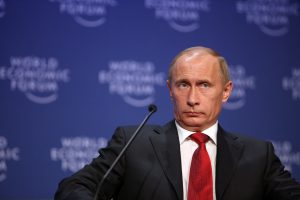Courage has a name. It is called Navalny. The courage shown by this man, this courage to deliberately sacrifice his life to set an example for a muzzled country, the courage to brave death, laughing, smilingand showing irony in the face of his executioners to the very end, the courage to open up new roads for History with his bare hands defying a tyrant who is a war monger, a liar and a murderer, this courage not only commands admiration.
It also obliges, obliges us all to rise to the occasion, Europeans, Russians and Americans alike, but will we?
Nothing has been settled yet, of course. The general feeling is even that, with his main opponent out of the way, scoring points in Ukraine and benefiting from Donald Trump’s hostility towards Europeans, the Russian President would have the wind in his sails. Much is said and read about this, but it is by no means certain.
For these same three reasons, because the murder of Alexei Navalny, the Russian breakthrough in Avdiivka and Donald Trump’s repeated refusal to defend European “delinquents” has given them a glimpse of the abyss of what a Russian victory would be, the 27 are raising their voices. The French President spoke of the need for a “European leap forward” against the “Kremlin regime”, which he denounced as a “methodical operator of the world’s destabilisation”. The German Chancellor spoke of the need to “strengthen the European pillar of NATO” and to develop our defence industries jointly over the long term. In a number of capitals there is a mea culpa about the EU’s over-cautious approach to arming Ukraine.
Member States large and small, East and West, are closing ranks, and both the European Parliament and the Commission are calling for a general mobilisation. The words are new. They are strong, and there is every reason to believe that they will be followed by action, because even before the alarm bells of the last few days, the 27 Member States had finally accepted the need for a common defence, emptied their arsenals in support of Ukraine and relaunched their arms production. By the end of 2024, the Union will have produced one million rounds of ammunition. Next year it will be two. The financial effort in favour of armies is increasing everywhere, and two ideas have now taken hold in Europe.
The first is that the EU must be able to help Ukraine on its own, without the Americans, if Donald Trump wins in November. The second is that, Trump or no Trump, the United States’ refocusing on the Chinese challenge is inevitable and Europe must prepare to take on greater responsibilities in the Atlantic Alliance and even witness the Americans turn away from it and weaken it.
With its back to the wall, constrained by America’s growing distance from Europe and the Kremlin’s imperial nostalgies, the Union is beginning its march towards the political union. It will be no easy task, and there is nothing to guarantee its success except necessity, which is already making law.
As far as the Russian regime is concerned, these are favourable times for them. For several months to come, Ukraine will be short of weapons and will remain without air protection. Within a few weeks, Russian troops could attempt an offensive. The points they could then score would give Vladimir Putin, re-elected without adversaries or debates, an aura of invincibility that would enable him to propose a ceasefire enshrining his annexations.
In other words, the Russian regime could secure a semblance of victory that would give it the breathing space it needs to rebuild its forces and launch new offensives. This is the black scenario. It is not unimaginable, but if the Russian regime is to achieve real success, time is running out. Ukraine will soon have an air fleet, which the Europeans have decided to supply along with new munitions. It is building up a defensive system that will stand up to Russian attempts to advance. In short, Vladimir Putin may still not have any convincing victories to show when, next winter, the absolute priority given to the military industry in Russia gives rise to social difficulties that will generate political discontent.
Russia’s internal stability is not assured. Vladimir Putin’s social base is shrinking. Next autumn, the courage of Alexei Navalny could bring out of the shadows resistance fighters who are unaware of their own existence as of yet.
Finally, Washington. Donald Trump and his friends in the House of Representatives are putting themselves to shame by blocking the aid that the White House would like to give Ukraine. With each passing day, the former president and his gang are making themselves responsible for hundreds of Ukrainian deaths. They are discrediting the United States, disgracing themselves and eroding transatlantic solidarity. They have become an international risk factor, and if they return to office, the European Union will have to face up to an American ally seeking to reach an agreement with Vladimir Putin at the Union’s expense. The Union must be prepared for the worst, but the fact is that the fear of finding itself naked, without an American umbrella or its own defence, is waking it up and forcing it to reinvent itself. Europeans need Europe, and it is with new force that this evidence is asserting itself.


